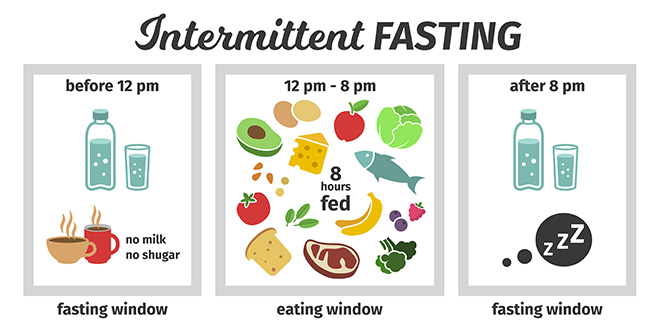A Beginner’s Guide To Intermittent Fasting

Are you thinking about a new diet plan and considering the popular ‘intermittent fasting’? If so, you’ve come to the right place.
Here, we’ll look at what you should avoid in an intermittent fasting plan, when you should eat, and a few other tips and tricks that can make this a very healthy and successful way to lose weight and keep a good overall health.
What Is Intermittent Fasting?
Intermittent fasting is more than just changing your eating habits, particularly the times of the day you consume food. The aim of intermittent fasting is to help people lose weight and establish healthy eating patterns.
Benefits Of Intermittent Fasting
- Flexible Diet Plan: One of the major benefits of the new intermittent diet is that it comes with much more flexibility than other kinds of diet plans. To find the best one suited for your lifestyle, you can select from the various intermittent fasting diets.
Here are some examples of flexible fasting diet plan methods:
- Leangains Protocol: This flexible diet plan is otherwise known as the 16/8 method, in which you need to skip breakfast. With this method, you can eat for hours, like 1 PM to 9 PM, and a fasting window of 16 hours.
- Eat-Stop-Eat: It’s a flexible fasting method wherein you will not eat for one day in a week.
- The 5:2 Intermittent Fasting Diet: This fasting diet involves consuming around 500 to 600 calories on two non-consecutive days. Then, you can eat normally for the rest of the days.
- Boosts Human Growth Hormone Levels: Fasting intermittently effectively boosts HGH levels, wherein a study shows doubled or tripled HGH levels after two to three days of fasting. This means that fasting may reduce a person’s body fat since fat has a direct effect on HGH production.
Also, it aids regulate insulin levels, keeping it reduced since the body releases insulin when food is consumed throughout the day.
- Weight Loss: It’s natural to lose weight when you’re fasting intermittently since the time and food intake are restricted.

Important Aspects Of Intermittent Fasting
- Food intake: The first part of the schedule is your food intake. You’re going to eat one meal per day and you’re going to eat it between five and eight hours after you’ve completed your exercise routine. As a tip, eat a protein-rich meal, like an egg or salmon, to make the most of the meal.
- Frequency of food intake: The second most important part of this diet is the frequency of you’re eating routine. Thankfully, you can choose a flexible schedule based on the information shared above.
- Allowed or not allowed foods: Your meals will consist of balanced diet foods or a variety of foods, like eggs, fish, chicken, rice, pasta, beans, and bananas, all of which are very low in calories. The foods that should be avoided are things that are high in fat, salt, or sugar, which can really mess with your blood sugar level.
How To Start Intermittent Fasting
Ensure a successful intermittent fasting by keeping important things in mind, such as your nutritional needs. So, how do you start intermittent fasting?
Here’s how:
- Decide on the times you’ll fast during the day: One of the common intermittent fasting methods is either the16-hour fast daily or fasting for 24 hours, twice a week. During the fasting periods, it’s important to eat either very little food or nothing at all.
- Eat breakfast: Breakfast is generally the most important meal of the day. Thus, eating breakfast is going to provide you with the energy you need to get through your day.
You should also include foods that are low in carbs, such as eggs, nuts, and whole grains, which will help regulate your blood sugar level and give you the energy that you need in a day.
- Limit dinner: It’s important that you limit your eating time during the evening because your body is going to need to burn the last of your calories at night.
- Plan your meals: Since your food intake is restricted at certain times of the day during intermittent fasting, you should plan your meals to ensure you get the right amount of nutrients and energy your body needs.
- Stick to your schedule: As much as possible, you should stick with your eating schedule until you get used to it. By doing so, you’ll have a successful intermittent fasting.
Conclusion
As you can see, there are many ways to carry out this eating pattern. All you have to do is to choose the most flexible plan for you. Keep in mind that you must still eat a variety of food to get the most of your meals.
Share via:





Leave a Comment